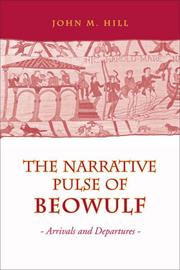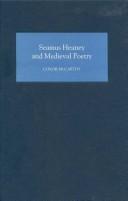| Listing 1 - 2 of 2 |
Sort by
|

ISBN: 144268867X 9781442688674 9780802093295 0802093299 9781442610873 1442610875 1442691948 Year: 2008 Publisher: Toronto, [Ontario] ; Buffalo, [New York] ; London, [England] : University of Toronto Press,
Abstract | Keywords | Export | Availability | Bookmark
 Loading...
Loading...Choose an application
- Reference Manager
- EndNote
- RefWorks (Direct export to RefWorks)
One of the most consistent critiques levelled against Beowulf is that it lacks a steady narrative advance and that its numerous digressions tend to complicate if not halt the poem's movement. As those passages often look backward or far ahead in narrative time, they seem to transform the poem into a meditative pastiche. The Narrative Pulse of Beowulf counters this assertion, examining Beowulf as a social drama with a strong, forward-moving narrative momentum.John M. Hill discerns a distinctive 'narrative pulse' arising out of the poem's many scenes of arrival and departure. He argues that such scenes, far from being fixed or 'type' scenes, are socially dramatic and a key to understanding the structural density of the poem. Bolstering his analysis with a strong understanding of the epic, Hill looks at Beowulf in relation to other stories such as The Odyssey and The Iliad, epics that, though they may appear to have a certain narrative elasticity, use scenes of arrival and departure to create a cohesive social world in which stories unfold. As a new and comprehensive study of one of the most important Old English texts, The Narrative Pulse of Beowulf sheds new light on this famous poem and the epic tradition itself.
Epic poetry, English (Old) --- Discourse analysis, Narrative. --- Narrative discourse analysis --- Narration (Rhetoric) --- History and criticism. --- Beowulf. --- Bjowulf

ISBN: 184615605X 184384141X Year: 2008 Publisher: Suffolk : Boydell & Brewer,
Abstract | Keywords | Export | Availability | Bookmark
 Loading...
Loading...Choose an application
- Reference Manager
- EndNote
- RefWorks (Direct export to RefWorks)
The first examination of the use made by Seamus Heaney of medieval poetry in his translations and adaptations, including the acclaimed 'Beowulf'. Seamus Heaney's engagement with medieval literature constitutes a significant body of work by a major poet that extends across four decades, including a landmark translation of 'Beowulf'. This book, the first to look exclusively at this engagement, examines both Heaney's direct translations and his adaptation of medieval material in his original poems. Each of the four chapters focuses substantially on a single major text: 'Sweeney Astray' (1983), 'Station Island' (1984), 'Beowulf' (1999) and 'The Testament of Cresseid' (2004). The discussion examines Heaney's translation practice in relation to source texts from a variety of languages (Irish, Italian, Old English, and Middle Scots) from across the medieval period, and also in relation to Heaney's own broader body of work. It suggests that Heaney's translations and adaptations give a contemporary voice to medieval texts, bringing the past to bear upon contemporary concerns both personal and political. CONOR MCCARTHY gained his PhD from Trinity College Dublin.
Poetry, Medieval --- European poetry --- Medieval poetry --- Translations into English --- History and criticism. --- Adaptations --- Heaney, Seamus, --- Heaney, Seamus --- Criticism and interpretation. --- Adaptation. --- Beowulf. --- Contemporary Concerns. --- Literary Influence. --- Medieval Poetry. --- Medieval Texts. --- Poetic Tradition. --- Seamus Heaney. --- Translation.
| Listing 1 - 2 of 2 |
Sort by
|

 Search
Search Feedback
Feedback About UniCat
About UniCat  Help
Help News
News